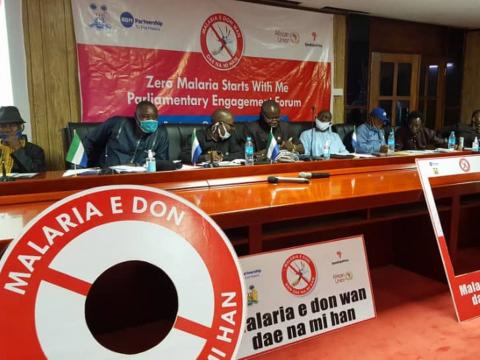By Mabinty M. Kamara
Members of the Sierra Leone Parliament have committed to play their part towards the eradication of malaria in Sierra Leone, as part of the global eradication goal target for 2030.
The lawmakers made the commitment at the Zero Malaria Parliamentary Engagement Forum held in Freetown on Friday, 23rd October. The engagement held in the Committee Room 1 in parliament brought together representatives of the Zero Malaria Starts With Me (ZMSWM) campaign, officials from the Ministry of Health and Sanitation and members of the parliamentary select committee on health.
“In the spirit of corporation, we as honorable members of the Sierra Leone parliament, therefore pledge to support the sub-national, and international efforts towards a malaria–free country and continent as part of the “Zero Malaria Starts with Me” campaign led by the RBM Partnership to end Malaria and the African Union,” a statement from the parliamentarians read out at the forum states.
The ZMSWM campaign is a pan-African campaign geared towards eradicating the parasitic disease on the continent.
Malaria is caused by a parasite called plasmodium, which is transmitted through mosquito bites. The illness is the largest killer among children and pregnant women, accounting for hundreds of millions of mortalities and hundreds of thousands of fatalities worldwide, mostly in Africa.
The ZMSWM initiative was launched by the Roll Back Malaria partners and the African Union at the 54th African Union Summit in July 2018 and was endorsed by all 55 heads of state of the continental body, including Sierra Leone’s president, Julius Maada Bio.
Some 15 countries have launched the campaign on the continent since then.
In Sierra Leone the campaign is being championed by the health ministry in collaboration with the Dakar-based NGO Speak Up Africa, which oreganized the engagement with lawmakers as part of its plan of its strategy in the country.
Officials said the purpose of the meeting was to inform parliamentarians of the impact that malaria has on the people of Sierra Leone and on the society as a whole, discus the goal of malaria elimination by 2030 and its importance for development and prosperity. The engagement was also meant to define an action plan between the Ministry of Health and the members of parliament.
In his statement, Chairman of the Parliamentary Committee on Health, Moses Baimba Jorkie, spoke about the dangers associated with malaria, noting that it was a laudable idea that they were discussing and learning about the sickness and joining in efforts to eradicate it.
“As parliamentarians, we have an important role to play in controlling and eliminating malaria. First and foremost, we have a responsibility to our citizens to provide them with the access to service and information needed to protect themselves and seek diagnosis and treatment when necessary. We collectively condemn the continuation of malaria in our society, which is an entirely preventable and treatable disease that in 2018 alone killed at least 1, 949 people and caused 1,781,855 cases in Sierra Leone,” the MP said.
The lawmakers further committed to increase the health budget from 11% to 15% of total spending, in alignment with the Abuja Declaration of African Union heads of state, to which Sierra Leone is a signatory. They also committed to increasing the budget line for malaria, HIV and TB from 0.2% of total budget (1.9% of health budget) to 0.4% of total budget (3.8% of health budget). The commitment also include the establishment of a high level multi sectorial End Malaria Council/Fund to help drive domestic resource mobilization.
In his presentation, Dr. Alhaji S. Turay, Deputy Programme Manager at the National Malaria Control Programmes in the Ministry of Health, noted that Malaria was a dangerous disease with so many devastating effects such as brain damage, economic hardship and said it can lead to abortion in pregnancy and maternal mortality.
Dr Turay said cognizant of the devastating effect of malaria on society, the government through his ministry decided to make its treatment free in all government health facilities across the country.
“Malaria is the most Killer disease in Sierra Leone. But since it is endemic and it is everywhere, people don’t take it very seriously. Lots of deaths are occurring in this country due to malaria. But you hear people say it’s just malaria, but people are dying of it. The unfortunate thing is that we hardly do postmortem in this country. When malaria kills somebody they attribute it to God. And it is not only the fever we get, but the complications attributed to malaria are very devastating,” he said, stressing that the most vulnerable groups are the pregnant women and the children under the age of five.
In his presentation, James Walen, Malaria Program Officer at Speak up Africa, the parliamentary engagement speaks to one of the three pillars of the campaign, which is political will and commitment for the elimination agenda, mobilization of state actors for the resources, investment and innovation for malaria elimination.
“The Zero Malaria Parliamentary engagement is key part of our strategy. The campaign advocate for greater investment in public health generally and to strengthen the health system as a whole,” Wallen said.
He added: “This is why we advocate for 15% government spending to be dedicated to health, in line with the Abuja declaration. The campaign also advocates for greater funds to be allocated to malaria specifically, given how malaria is a significant public health issue.”
During the plenary session, MPs made various inputs on how to eradicate malaria in the country and to ensure patient safety in the hands of health workers in remote communities.
Copyright © Politico Online








